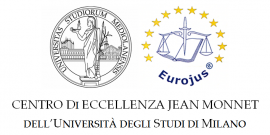The German Federal Court and its first ultra vires review: a critique and a preliminary assessment of its consequences
Il saggio esamina la sentenza della Corte Federale tedesca del 5 maggio 2020 che riguarda il programma di acquisto di attività del settore pubblico sui mercati secondari (PSPP), la cui validità è stata confermata dalla Corte di Giustizia europea nel rinvio pregiudiziale relativo alla causa Weiss (C-493/17). Nonostante ci sia stato un crescendo nelle sentenze del BundesVerfGericht (BVerfG) con riguardo alle condizioni alle quali l’UE può esercitare i suoi poteri, la pronuncia in esame, ha colto di sorpresa. Infatti, per la prima volta la Corte tedesca ha ritenuto che una sentenza emessa dalla Corte del Lussemburgo, nel contesto di un rinvio pregiudiziale, non sia vincolante in quanto quest’ultima ha ecceduto le sue competenze. La posizione della BVerfG può essere criticata poiché mette in discussione l’autorità della Corte di Giustizia e potrebbe provocare una “crisi nella crisi”. Altre censure sono rivolte al modo in cui il principio di proporzionalità viene interpretato e all’utilizzo della dottrina della ultra vires review anche in relazione alla decisione della BCE istitutiva del PSPP per un mero vizio di motivazione. Infine, viene criticata la dichiarazione che con la sentenza Weiss the Corte di Giustizia avrebbe violato l’indipedenza della BCE. Il saggio sostiene che la Commissione dovrebbe aprire un ricorso per infrazione che potrebbe essere chiuso nella fase pre-contenziosa; considera anche che la sentenza del BVderfG non dovrebbe mettere a rischio la legalità del programma temporaneo di acquisto per l’emergenza pandemica (PEPP); infine, afferma che ogni discussione sulla possibile mutualizzazione del debito debba considerarsi chiusa a seguito della sentenza. Anche la recente proposta di creare un fondo per la ripresa, che ha di per se stessa risvolti indubbiamente positivi per l’UE e potrebbe essere considerata una reazione del governo tedesco alla sentenza della BVerfG, ha l’effetto di ritardare la discussione sulla costruzione di un’autentica unione economica e monetaria.
The essay examines the ruling of the German Federal Court of 5 May 2020 concerning the secondary markets public sector asset purchase programme (PSPP), set up in 2015 and whose validity was confirmed by the Court of Justice in the Weiss case (C-493/17). Although there has been a crescendo on the conditions set out by the BundesVerfGericht (BVerfG) to the exercise of EU powers, the ruling which is commented, came as a surprise. Indeed, for the first time the German Court held a judgment of the Luxemburg court, in the context of a preliminary ruling, is not binding since the latter has acted ultra vires. The position of the BVerfG can be criticised since it undermines the authority of the Court of Justice and may cause “a crisis within the crisis.” Other critiques concern the way the principle of proportionality is interpreted, the same use of the doctrine of ultra vires review with respect to the ECB’s decision instituting the PSPP for its failure to adequately motivate the Programme. Furthermore, the BVerG’s position on the impact of the Weiss ruling on the ECB’s independence may be criticised. The essay argues that the Commission should open an infringement procedure which could be closed in the pre-trial phase; the ruling of the BVerfG is not likely to put at risk the legality of the Pandemic Emergency Purchase Programme (PEPP); finally, it is claimed that any discussion on the mutualization of debt is closed as a result of the judgement. In addition, the recent proposal to set up a recovery fund, which is in itself a positive development for the EU and may be considered a reaction of the German government to the ruling of the BVerfG, is likely to delay the discussion on the creation of a genuine European Monetary Union.
per leggere il testo completo – to read the full article: S. Poli – The German Federal Court and its first ultra vires review


